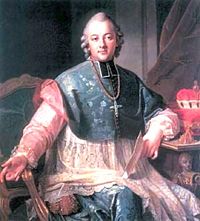
Born: February 3, 1735, Dubiecko, Polish-Lithuanian Commonwealth (presently Poland)
Died: March 14, 1801, Berlin, Prussia (presently Germany)
Early days. Krasicki was born into a family bearing the title of count of the Holy Roman Empire. He was related to the most illustrious families in the Polish-Lithuanian Commonwealth. He attended a Jesuit school in Lwów, then studied at a Warsaw Catholic seminary (1751-54). In 1759 he took holy orders, and continued his education in Rome (1759-61). Two of his brothers also entered the priesthood.
Career. Returning to Poland, Krasicki became secretary to the Primate of Poland and developed a friendship with the future King Stanisław August Poniatowski. When Poniatowski was elected king (1764), Krasicki became his chaplain. He participated in the King's famous "Thursday dinners" and co-founded the Monitor, the preeminent Polish Enlightenment periodical, sponsored by the King. In 1766 Krasicki was elevated to Prince-Bishop of Warmia, with the title of Prince and ex officio membership in the Senate of the Commonwealth. This office gave him a high standing in the social hierarchy and a sense of independence. It did not, however, prove a quiet haven. The chapter welcomed its superior coolly, fearing changes. At the same time, there were growing provocations and pressures from Prussia, preparatory to seizure of Warmia in the First Partition of the Polish-Lithuanian Commonwealth. Krasicki protested publicly against external intervention. He also wished to save Warmia from civil war. In 1772, as a result of the First Partition of the Polish-Lithuanian Commonwealth, instigated by Prussia's King Frederick II ("the Great"), Krasicki became a Prussian subject. He did not, however, pay homage to Warmia's new master. He would now make frequent visits to Berlin, Potsdam and Sanssouci at the bidding of Frederick, with whom he cultivated an acquaintance. This created a difficult situation for the poet-bishop who, while a friend of the Polish king, was forced to maintain social and administrative contacts with the Prussian King. Soon after the First Partition, Krasicki officiated at the 1773 opening of St. Hedwig's Cathedral. In 1786 Krasicki was called to the Berlin Akademie der Künste (Arts Academy). His residences at Lidzbark and Smolajny became centers of artistic patronage. In 1795, six years before his death, Krasicki was elevated to Archbishop of Gniezno (thus, Primate of Poland). Krasicki was honored by the King of Poland with the Order of the White Eagle and the Order of Saint Stanisław, as well as with a special medal featuring the Latin device, "Signum laude virum musa vetat mori"; and by the King of Prussia, with the Order of the Red Eagle. Upon his death in Berlin in 1801, Krasicki was laid to rest in St. Hedwig's Cathedral in Berlin, which he had consecrated. In 1829 his remains were transferred to Poland's Gniezno Cathedral.
Works. Krasicki's literary writings lent splendor to the reign of Poland's King Stanisław August Poniatowski, while not directly advocating the King's political program. Krasicki, the leading representative of Polish classicism, debuted with the strophe-hymn, Święta miłości kochanej ojczyzny (Sacred Love of the Beloved Country). He was then about forty years old. It was thus a late debut that brought the extraordinary success of this strophe, a fragment of song IX of the mock-heroic poem, Myszeidos (Mouseiad, 1775). Krasicki here formulated a universal idea of patriotism. The strophe would later, for many years, serve as a national hymn and see many translations, including three different ones into French. The Prince Bishop of Warmia gave excellent Polish form to all the genres of European classicism. He also blazed paths for new genres. Prominent among these was the first modern Polish novel, Mikołaja Doświadczyńskiego przypadki (The Adventures of Nicholas Experience, 1776), a synthesis of all the varieties of the Enlightenment novel: the social-satirical, the adventure (ŕ la Robinson Crusoe), the Utopian and the didactic. Tradition has it that Krasicki's mock-heroic poem, Monachomachia (War of the Monks, 1778), was inspired by a conversation with Frederick II at the palace of Sanssouci, where Krasicki was staying in an apartment once used by Voltaire. At the time, the poem's publication caused a public scandal. The most enduring literary monument of the Polish Enlightenment is Krasicki's fables: Bajki i Przypowieści (Fables and Parables, 1779) and Bajki nowe (New Fables, published posthumously, 1802). The poet also set down his trenchant observations of the world and human nature in Satyry (Satires, 1779). Other works by Krasicki include the novels, Pan Podstoli (Lord High Steward, published in three parts, 1778, 1784 and posthumously 1803), which would help inspire works by Mickiewicz, and Historia (History, 1779); the epic, Wojna chocimska (The Khotyn War, 1780); and numerous other works, in homiletics, theology and heraldry. He also published, in 1781, a two-volume encyclopedia, Zbiór potrzebniejszych wiadomości (A Collection of Needful Knowledge), the second Polish general encyclopedia after Nowe Ateny (The New Athens) of Benedykt Chmielowski. He wrote Listy o ogrodach (Letters about Gardens), and articles to the Monitor and to his own newspaper, Co Tydzień (Each Week). He translated Plutarch and Ossian into Polish. Krasicki's major works won European fame and were translated into Latin, French, German, Italian, Russian, Czech, Croatian, Slovene, Hungarian. The broad reception of his works was sustained throughout the 19th century. Krasicki has been the subject of works by poets of the Polish Enlightenment — Trembecki, Zabłocki, Mier — and in the 20th century, by Gałczyński.
This article uses material from the Wikipedia article "Ignacy Krasicki" licensed under the GNU Free Documentation License. :
Wikipedia
See also:
English translation of Krasicki's fables
Satires and letters (in Polish)
Various works (including full texts of novels) in Polish
Virtual Library of Polish Literature (Prof.Irena Kadulska)
English translations of some of his works see:
Constance J. Ostrowski
Return to home page:
Prominent Poles